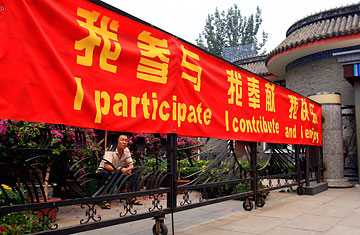
A banner hangs in Ritan Park, one of three Beijing parks where demonstrators have been sanctioned to stage protests during the 2008 Beijing Olympics — after applying to do so through the government
Zhou Shuguang wanted to visit his mother. Normally, that wouldn't be a problem for the 28-year-old vegetable seller, blogger and self-described occasional "citizen reporter." He'd jump on a bus and ride the twenty kilometers from Meitanba, the village deep in rural central China where he lives, to his mother's place. But Zhou, who sometimes highlights cases on his blog that pit ordinary citizens against local government authorities, hadn't considered one vital fact: the Olympic Games being held in Beijing, some 1000 kilometers away. Soon after he arrived at his parents house on Aug. 14, 'Zuola,' as he calls himself in honor of the pioneering French writer, found himself bundled into a car, driven back to his house and warned not to go anywhere until the Games were over.
Plenty of similar tales have surfaced in recent weeks of how Chinese expressing even mild dissent have been jailed, intimidated, forced to leave Beijing or barred from coming to the capital for the Games. When the Games were awarded to China in 2001, the International Olympic Committee and some Chinese officials argued that they would act as a force for openness. But both Amnesty International and Human Rights Watch have published reports in the weeks leading up to the Games arguing persuasively that they've had the opposite effect. The forcible suppression of dissent and the jailing of activists has worsened significantly, they and other groups report, particularly in the months before the Aug. 8th opening ceremony.
Now that the Olympics are halfway through, says Nicholas Bequelin, China researcher with HRW, any remaining hope that the authorities would relax once the Games were underway has also been dispelled. Bequelin notes that they "wouldn't even allow protests in their own designated protest zones in Beijing — protests that couldn't possibly have hurt anyone." Instead, at least five Chinese citizens applying to protest in the three official zones have been arrested as they've tried to register. Beijing has not commented on the arrests, but the state media has reported that all of the 77 protest applications submitted have been withdrawn.
It's not just activists who are feeling the pressure. Li Heping, a public interest lawyer who has been detained and held for days at a time by security forces during past sensitive periods such as Communist Party Congresses, said he had been followed the day of the opening ceremony, but not arrested. Nevertheless, Li added, the authorities have been growing increasingly strict and may well remain so after the Games are over. "There used to be some sensitive events and days when we would be watched, such as June 4th," Li said, referring to the anniversary of the bloody suppression of protests in Tiananmen Square in 1989. "But now it's happening more and more. It seems to me that extra sensitivity will continue after the Olympics."
Li's fear is a common one. If Beijing has been in the international spotlight and still carried out a harsh crackdown against activists and other dissenting voices without real repercussions, its hardliners might argue that they could continue those tight controls even after the Olympics are fading memories. Another school of thought, however, believes the national social mobilization effort, such as getting hundreds of thousands of citizen volunteers to look out for terrorists in the capital, and the economic cost of ensuring a peaceful and smooth Games mean the authorities will have no choice but to loosen their grip.
Social discord is on the rise, says Bequelin, and contributing to that is Beijing's increased tightening of control over the media and reducing access to courts and the petitioning system that allowed people in the provinces to bring their complaints to the capital. Those measures have left no avenue through which victims of China's headlong rush to development, like those who have had land seized, can express their unhappiness. "The pressure is building in the pressure cooker and there's no current avenue for it to be released," he says. "I believe we will see many calls both inside and outside the party to put some sort of reforms on the agenda again."
With the economy also showing signs of weakness, there's little doubt that how Beijing handles issues of dissent and social instability in the post-Games period will have a lasting impact on China's future. And though not everyone shares his sunny outlook, Bequelin remains optimistic about China’s nascent civil society, whose development was temporarily put on ice in the lead up to the Games. "It's a battle in which Chinese are trying to get government off their backs," he says. And what's being fought for by people like Zhou is access to information and the right to organize. Those are "fundamental tools Chinese people need to organize their lives in a market economy," he says. "I don't see how progress on those fronts can be reversed or slowed down in the long term."
